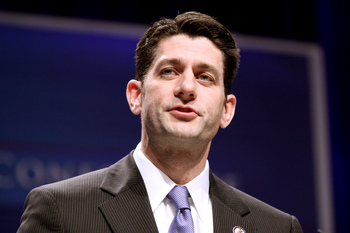
Presumptive Republican veep nominee has proposed cutting agency funding and deregulating industries.
Now that Republican presidential candidate Mitt Romney has announced that Representative Paul Ryan will serve as his running mate, Ryan’s plans for deficit reduction and Medicare reform have garnered increasing – and even heated – attention on the campaign trail. Although Ryan’s views about regulation are getting less attention at the moment, his budget plan and voting record in Congress both reveal a highly skeptical view of federal regulations and a desire to overturn many regulatory programs instituted under the Obama Administration.
Obviously Ryan will publicly support Romney’s own regulatory reform plans – something that a look at Ryan’s own statements and track record suggests will not be difficult for the vice presidential candidate to do.
Ryan’s budget proposal, The Path to Prosperity, would have particularly forceful, as well as constraining, impact on energy regulation and housing market reform if it were adopted. Further, many agencies, especially those like the Department of Transportation that have received fiscal increases during the Obama Administration, would likely see their budgets shrink and their mandates constrained as Ryan has vowed to “scal[e] back funding for agencies whose recent budgetary increases have fueled the epidemic of crony politics.”
Ryan has also supported measures that cut or suspend economic regulations. However, some of Ryan’s promises for regulatory overhaul, such as revisiting the Dodd-Frank Act to eliminate any chance of another federal bailout, may turn out to be more rhetoric than real policy.
On energy regulation, Ryan has proposed an “all-of-the-above” approach that maximizes domestic energy production and cuts government investment in alternative energy. He has attacked as a “failed energy policy” the Department of Energy’s $20 billion loan guarantee program for developing renewable energy. Further, Ryan has argued that the Obama Administration’s attempts at a cap-and-trade regime – either through legislative efforts or the actions of the Environmental Protection Agency (EPA) – only made “commercially competitive sources of energy more expensive.”
Under the Ryan budget proposal, the focus would shift to achieving maximum domestic energy production. Cap-and-trade would have no place in federal policy. Instead, the government would lift drilling moratoriums currently in place and limit the EPA’s discretionary power to regulate fossil fuel use to increase production of what Ryan has called “commercially competitive sources of energy.”
Ryan also favors approving the Keystone pipeline project and lightening regulatory burdens imposed on nuclear energy. On the issue of alternative sources of energy, he has argued that the government should cut its research subsidies and investment, preferring to allow the market to find sustainable solutions. Ultimately, Ryan would measure success in energy regulation by ensuring “reliable energy, lower energy prices, greater revenue generation through prosperity, and market-based solutions for sustainable energy.”
When it comes to housing policy, Ryan has decried “the government’s abysmal track record of interference in the housing market” and proposed privatizing Fannie Mae, Freddie Mac, and other government-sponsored enterprises (GSEs). Ryan has argued that the current system in which GSEs account for virtually all of the market for the issuing new mortgage-backed securities shift losses to taxpayers and allow profits to go to Wall Street.
The Ryan budget would see “eventual elimination” of Fannie Mae and Freddie Mac as governmental entities, though how the privatization would occur without causing enormous turbulence in the financial market is not explained. Ryan has further noted that the Federal Housing Administration (FHA) may need a federal bailout and he has proposed reforming the Credit Reform Act to reflect the full risk of FHA loans in the federal budget. Overall, Ryan seems to favor winding down the federal government’s role in backing mortgage loans to eliminate any chance of another federal bailout.
Not surprisingly, Ryan’s budget plan also calls for other forms of deregulation. He has noted that “[t]he free enterprise system is being stifled by a federal bureaucracy fixated on depriving citizens and businesses of their ability to make social and economic decisions according to what is best for their own needs and interests.” Most agencies, except likely for defense-related ones, would not expect their budgets and staffing levels to increase.
Cuts would be especially severe for those agencies that received a boost under President Obama, such as the Department of Transportation. Pointing out that funding for the agency grew by 24 percent, Ryan has singled it out as an example of wasteful spending. He has argued that the Obama Administration oversold the economic benefits of building federal highways and intercity high-speed rails. Ryan has suggested that such infrastructure should be built not based on federal subsidization but instead on private investment: “[H]igh-speed rail and other new intercity rail projects should be pursued only if they can be established as self-supporting commercial services.” Accordingly, Ryan’s budget would eliminate federal funding to the Department of Transportation for these projects.
In addition to his budget proposal, Ryan’s voting record as a member of the House of Representatives further indicates a desire on his part to eliminate, or at least suspend, costly regulations. For example, he recently voted for the Red Tape Reduction and Small Business Job Creation Act (H.R. 4078), a bill that would block significant regulatory actions until the unemployment rate drops to below 6 percent. That vote followed his co-sponsorship in 2011 of the Regulatory Moratorium and Jobs Preservation Act (H.R. 2898), which did much the same thing except with an unemployment rate goal of 7.7 percent.
Although Ryan has attacked the Obama Administration’s efforts to regulate the financial services industry as “crony capitalism at its worst” and has promised to revisit the Dodd-Frank Act to ensure that the government does not micromanage the financial system, his budget proposal lacks much in the way of detail about his views on financial regulation. Ryan clearly opposed bailing out any Wall Street institutions and has vowed to institute only those financial regulations that pass the cost-benefit test and to phase out any programs for bailouts.
The image of Paul Ryan is by Flickr user Gage Skidmore and is used under a Creative Commons license.



